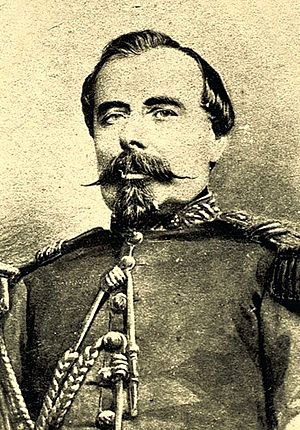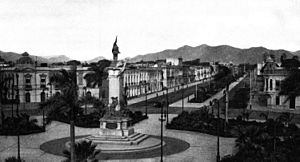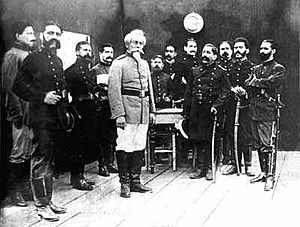Francisco Bolognesi facts for kids
Quick facts for kids
Francisco Bolognesi
|
|
|---|---|

Bolognesi in 1880
|
|
| Born | November 4, 1816 Lima, Viceroyalty of Peru |
| Died | June 7, 1880 (aged 63) Arica, Peru (now Chile) |
| Allegiance | |
| Years of service | 1853–1880 |
| Rank | Colonel Marshal of Peru (posthumous) |
| Battles/wars | Ecuadorian–Peruvian War War of the Pacific
|
Francisco Bolognesi Cervantes (born November 4, 1816 – died June 7, 1880) was a brave Peruvian military leader. He is remembered as a national hero in Peru. The Peruvian government even named him the official protector of the Army of Peru in 1951.
Contents
Early Life and Education
Francisco Bolognesi was born in Lima, Peru, on November 4, 1816. He went to school at the Seminary of Arequipa until he was 16 years old. After that, he started a career working in business.
His father, Andrés Bolognesi, had Italian-Peruvian roots. He was a talented violin player for the ruler of Peru at the time, known as the Viceroy.
Starting a Military Career
Francisco Bolognesi first got involved with the military in July 1844. This happened during an event in Carmen Alto, a district near Arequipa in southern Peru. Even though he was offered a military job, he chose to stay in civilian life for a while.
However, in 1853, he decided to join the army. He quickly became the second-in-command of a cavalry group. This was during a time when Peru and Bolivia were having some disagreements.
Even though there wasn't a war with Bolivia, Bolognesi decided to stay in the military. He later joined a movement against the president at the time, José Rufino Echenique. After this movement was successful, Bolognesi was promoted to Lieutenant Colonel.
In 1856, Bolognesi was in charge of the artillery (large guns) that helped stop a rebellion. This rebellion was led by General Manuel Ignacio de Vivanco in the city of Arequipa. Because of his success, Bolognesi was promoted again, this time to Colonel.
He later went on several trips to Europe. His mission was to buy weapons, especially artillery, for Peru's army. When he returned to Peru in May 1866, he faced some trouble with President Don Mariano Ignacio Prado. He was even put in prison for a short time in 1867.
After President Prado left office, Bolognesi returned to military service. He commanded different artillery units in the Peruvian army. He retired in 1871 as the Commander-in-Chief of all artillery.
The War of the Pacific
In 1879, the War of the Pacific began. This was a conflict between Chile and an alliance of Peru and Bolivia. Even though Bolognesi was 62 years old, he rejoined the Peruvian Army.
He played an active role in battles against the Chilean forces. This included the Battles of Dolores and Tarapacá in November 1879. In April 1880, he was put in charge of defending the Peruvian port city of Arica.
Bolognesi commanded the Peruvian soldiers who were surrounded in Arica. Chilean troops had won a battle at Tacna and then moved to Arica. Bolognesi bravely organized the defense of the city. He had about 1,600 men, while the Chilean forces had over 5,300 soldiers and strong naval support.
A Famous Reply
Chilean messengers came to Arica and demanded that Bolognesi surrender. They pointed out that they had three times more soldiers than he did. Bolognesi gave a very famous reply: "Tengo deberes sagrados que cumplir y los cumpliré hasta quemar el último cartucho."
This means, "I have sacred duties to fulfill, and I will fulfill them until the last cartridge has been fired." This phrase, "hasta quemar el último cartucho" (meaning "Until the last bullet is fired"), is now the official motto of the Peruvian Army.
The Battle of Arica
After Bolognesi's brave refusal to surrender, the Battle of Arica began. The Chilean forces attacked first, focusing on Fort Ciudadela. Peruvian soldiers fought fiercely there.
During the intense fighting, Colonel Bolognesi was shot and wounded. He kept fighting with his revolver. He was eventually killed by a blow to the head. His soldiers bravely defended his body until they too were killed.
On June 7, 1880, the Chilean forces took Arica. They lost 474 soldiers. Sadly, almost 1,000 Peruvian defenders, including Colonel Bolognesi, died defending the town.
Many wounded Peruvian prisoners were killed by the Chileans after the battle. The Chileans also damaged buildings and started fires. These actions were said to be revenge for some explosions caused by Peruvians during the battle.
Bolognesi's sons, Enrique and Augusto, also fought in the War of the Pacific. They both died later in battles near Lima, during the Battle of San Juan and the Battle of Miraflores.
See also
 In Spanish: Francisco Bolognesi para niños
In Spanish: Francisco Bolognesi para niños
- War of the Pacific
- Roque Sáenz Peña
- Alfonso Ugarte
- Coronel Bolognesi



